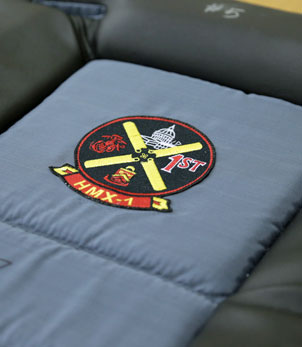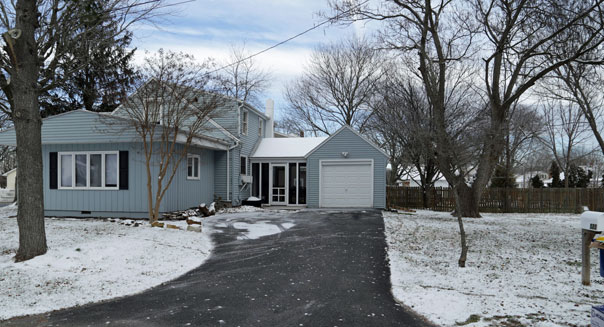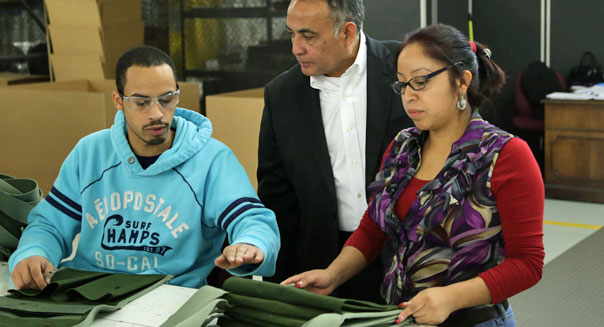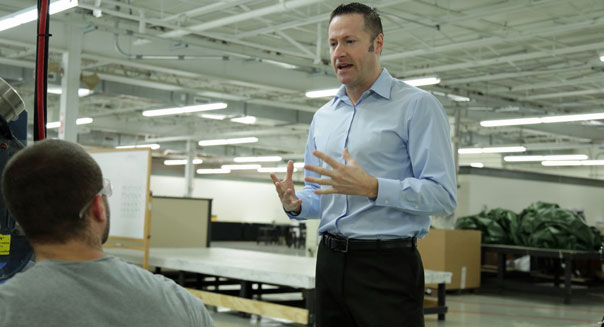From a Humble Garage to Soaring With the Air Force
Sometimes, Eli Valenzuela, CEO of First State Manufacturing, looks at his office in Milford, Delaware, and thinks, “This is too big.”
Sure, at 800 square feet, the room is quite large. But the statement is more about Valenzuela — who also founded the growing multimillion dollar industrial and commercial sewing company — than the room itself. He’s a man with humble beginnings, a man who remembers being called a pachuco or “street urchin” as a teenager in the projects of Corpus Christi, Texas.
Valenzuela has come a long way since then.
His journey from poverty to successful CEO all began with an advertisement for a mail order upholstery class that Valenzuela read in the back of a magazine. At the time, he was an Army tank operator in Germany with a lot of time on his hands. Valenzuela figured it would keep him busy and maybe allow him to earn a few extra bucks. He completed most assignments by hand and bought a secondhand sewing machine to finish his final exam.

Valenzuela’s sewing training led to a civilian job at Dover Air Force Base in Delaware, where he and his wife, Sher, had moved to care for her mother. There, he installed new upholstery in C5’s, the largest planes in the Air Force. Many days he came home furious at the substandard product the Air Force was paying plenty for. Half of the materials provided by contractors weren’t made correctly, and Eli had to fix them before they could even be installed.
At night he took on odd jobs sewing boat cushions and repairing upholstery for local restaurants. His one-car garage, which doubled as his manufacturing space, was small and unheated. Big jobs were cut out on the driveway using the same electric knife that cut the Thanksgiving turkey. Sher worked from home as an editor for a local paper so she could care for their newborn son.
The Valenzuelas were building a life for themselves in Delaware when they received news that would change their world forever. Their son, Simon, was diagnosed with autism. The couple was told he would never read, write or communicate effectively. Doctors recommended special services that Simon should have to help him build basic survival skills. None of those services were covered by insurance.
The couple soon had to face a tough reality — their paychecks wouldn’t be enough to provide the help their son needed. They would have to create any opportunity to change that. So Eli and Sher did something most people don’t dream of doing, even in the best of times.
In 1998, in rural Milford, where 65 percent of the houses were rentals and a warehouse ghost town stood as a reminder of a once-thriving industrial center, the Valenzuelas threw away traditional security, quit their jobs and started First State Manufacturing.

Chapter 1: ‘And Then Some’
No magic elves showed up to sew or even provide work for the Valenzuelas when they opened shop. Eli swallowed his pride to ask his mother-in-law for a $5,000 loan to start the business. Many a bill was paid with a credit card and a prayer. To find business, they literally drove around looking for possible clients.
At that time, all jobs were Delaware-based: covering worn seats in restaurants, sewing an awning here and there or refurbishing an auto interior. Their big break came from Eli’s old employer, Dover Air Force Base. Knowing the poor quality the base was getting, Eli asked for an opportunity to take over refurbishment jobs. With the help of a small business counselor to navigate the government contract bidding system combined with their own more durable, more comfortable, less expensive prototype seat, First State won its first government job to reupholster the interiors of the C5 fleet at Dover. That contract opened the door to a myriad of military upholstery jobs, proving what Eli knew from the beginning — they could do a better job for less money.
Small job or big, the Valenzuelas were determined their company would always go beyond what was expected. If they were recovering a seat in a restaurant, they didn’t just clean around the area where they worked, they vacuumed the whole restaurant. Asked to develop a seat to fit one brand of military airplane, they developed one interchangeable to three.
At First State they call it the “and then some” principle of business. No job is done to minimum specifications; there is always something extra. It’s a mantra that brought success, and then some, to the company.
Today, First State Manufacturing is housed in a 70,000-square-foot factory and employs more than 80 people. It has grown by a minimum of 25 percent each year for the last two years. Contracts run in the millions now, rather than the thousands. The company’s international product line includes protective vests for military, police and umpires, window treatments for national hotel chains and protective headgear for pharmaceutical research. It recently started recovering and redesigning seats for metro subway and train systems.
“We didn’t know how humble our beginnings were,” Sher says of those naïve early days. “We weren’t aware of what we couldn’t do [so we just did it].”

Chapter 2: Paying it Forward
At First State, innovation of product is important, almost as important as the people who provide it. Finding and developing the right people for each job is essential to what the company does. Anyone at First State can suggest a better way to do something and expect to be heard. People visiting the shop often comment on how “happy” the place seems.
“It’s because we’re family,” says Janelys Romero, a line supervisor for the sewing department. Romero can take technical drawings — and sometimes just ideas from clients — and turn them into perfect prototypes. She also enjoys teaching others at the company her valuable skill set — because someone once did the same for her.

When she was just 16, Romero immigrated to Delaware from Guatemala to live with her brother, an employee at First State. She arrived with no grasp of English and barely any prospects. Romero’s brother, unaccustomed to the American school system, asked Eli to help his sister get an education. “I’ve always had a heart for helping children,” says Eli, who quickly agreed. Eli accompanied them to the local high school, where he translated for the two to get Romero enrolled. He also gave Romero work at the factory and, along with the assistance of her brother, taught her how to sew.
But in order for Romero to truly excel, Eli told her that her English needed to be much better, so she began taking classes at the First State factory — a benefit sponsored by the company.
Today, Romero takes every opportunity to pay the kindness forward. She’s also highly regarded at the factory and seen as a key to the company’s success.
But Romero’s story isn’t unique at First State. Countless employees there have stories of how they were helped, often by Eli himself. At the company, people aren’t categorized by their limitations; but rather, by their potential that can be cultivated. Each year at First State’s annual employee appreciation day, the upper management spends time reviewing all employees and their skill set, learning what they bring to the table and how they want to grow. It keeps people in the company connected and fosters an environment where everyone from the cleaning staff to the top brass feels respected and looked out for.
“It’s about knowing your people, their passions and their skills,” says Sher. “Then putting them in the right place.”

Chapter 3: The Good in Every Situation
Scott Crothers, marketing director of First State, is constantly telling everyone, “Train your mind to see the good in every situation.” It’s another hallmark of the company philosophy, one that helped them get through a particularly dark time.
Right after 9/11, First State almost closed its doors. The company had concentrated most of its business on military contracts, but after the terrorist attacks, military planes were too busy flying missions to be shut down for refurbishment. The contracts that First State had counted on dried up as the Department of Defense shut down outside work to assess its military strength.
While the company limped along on the few commercial jobs it had, it started sewing American flags, which they it locally. For Eli, an Army veteran, it was the least the company could do to show support for the country.
But its former flood of business was now just a trickle, as was cash flow.
To lift morale, Sher remembers quoting Gen. George Patton: “Success is how high you bounce when you hit bottom.”
With payroll to meet and suppliers calling for their money, layoffs were the next step. It was then that Sher read an advertisement for Small Business Administration Economic Injury Disaster Loans — a government program set up to help companies struck by disaster. First State qualified. The $85,000 loan allowed it to pay suppliers and meet payroll as it expanded its product line to entice more commercial jobs, like hotel window treatments, padding for roller coasters and movie theater carpeting. In the end, it was able to keep all its employees and emerged a stronger company.
Post-9/11, diversification and flexibility are the keys to First State’s successful business model. The company is also thriving thanks, in part, to the founding principals of tenacity, hard work and never backing down from any obstacle.
In the almost-20 years since First State began in that unheated garage, the Valenzuelas have faced many a challenge head-on, without considering failure as an option. And their unbreakable determination hasn’t just benefited their growing business. Eli and Sher’s son Simon, who was the driving force behind the company’s very formation, has made great strides as well. The boy who was once told would never read, write or communicate effectively is now 24, a community college graduate and living in an independent group home.
“Dream big. You can always build something better in America,” says Eli. “I do believe [things are possible] only in America,” says Sher of the unlimited opportunities she imagines for her son and company. “Where else do you see that kind of beauty?”
[source : dailyfinance.com]
